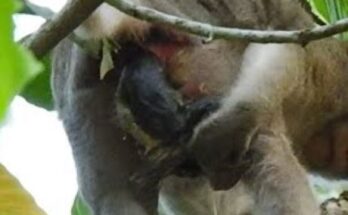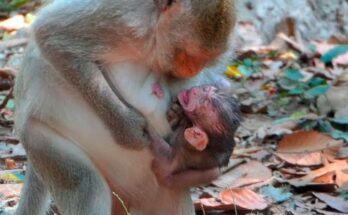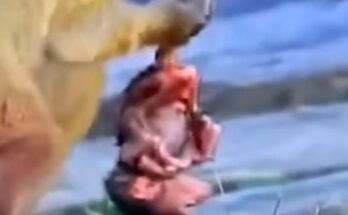Life in the wild is a constant struggle for survival, where the law of nature is often cruel and unforgiving. For many animals, including monkeys, injuries are not uncommon. Whether caused by territorial disputes, predation attempts, falls, or accidents, injuries can severely impact a monkey’s ability to survive. Unlike humans, these animals lack access to medical care or the support systems needed to recover, leaving them to fend for themselves in a harsh environment.
Monkeys live in dynamic social groups where cooperation and hierarchy play crucial roles. However, when a monkey is badly injured, the group often cannot provide the type of assistance that would aid recovery. While some species demonstrate remarkable empathy and grooming behaviors to soothe their injured members, they cannot mend broken bones, treat infections, or heal deep wounds. An injured monkey may struggle to keep up with the group, putting it at greater risk of predation or abandonment.
Physical injuries, such as broken limbs or open wounds, can be life-threatening. A monkey with a broken arm, for instance, may be unable to climb trees, a critical skill for finding food and evading predators. Open wounds can attract parasites or lead to infections, which, without intervention, can become fatal. In some cases, injured monkeys are even targeted by members of their own group, especially in species with rigid dominance hierarchies. An injured individual may lose its rank or face aggression from others, compounding its challenges.
Despite these grim realities, monkeys are incredibly resilient creatures. They often demonstrate a surprising ability to adapt, even when injured. Some monkeys have been observed using their remaining strength and skills to navigate their environment creatively. For example, a monkey with a missing limb may learn to compensate by relying more heavily on its other limbs or developing unique ways to move and forage.
Nevertheless, the absence of medical intervention highlights the stark difference between human and animal experiences. Where humans rely on hospitals and caregivers, wild monkeys must navigate a world where survival depends entirely on their instincts, adaptability, and luck. This reality underscores the importance of preserving natural habitats and minimizing human interference, as even minor injuries can have cascading effects on populations already facing threats from deforestation, hunting, and climate change.
In the wild, life is a constant battle. For injured monkeys, the fight is even harder—a testament to the raw and relentless nature of survival.
4o
O


